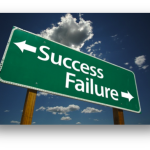 Ever have one of those days? Whether it’s due to events outside your control, or your own stupidity (which is more likely) the natural course of the universe dictates that some days you are the dog, and some days you are the fire hydrant.
Ever have one of those days? Whether it’s due to events outside your control, or your own stupidity (which is more likely) the natural course of the universe dictates that some days you are the dog, and some days you are the fire hydrant.
It happens to everybody. I’m just about done with one of those down days, after having a long run of amazing, kick-ass up days. I could beat myself up, or just go with the flow and get back up tomorrow. At least my cat picked today to cough up a furball on my clean bedspread. Into the wash, and clean as new, just like tomorrow.
So how can we reset and become productive again after having the inevitable bad patch?
Keep Trying
There’s the famous story in the orchestra world about the French Horn player who was going to quit after 45 with no luck. He decided to take one more audition, and got a job with the Boston Symphony. History is full of famous people, from Albert Einstein to Steve Jobs, who were told they were failures or that their ideas were crazy.
It’s the people who DON’T get back up after failure that we don’t ever hear about. If you want to wallow for a while in a pitiful heap, go ahead. Just know that at some point, you need to give it one more try.
Take Responsibility
 Sooner or later you will realize that small choices you made a long time ago have come back to haunt you now. Didn’t change the oil in your car for three years? Then why are you surprised your engine died? Remember all that junk food you ate when you were a teenager? What does the scale say now?
Sooner or later you will realize that small choices you made a long time ago have come back to haunt you now. Didn’t change the oil in your car for three years? Then why are you surprised your engine died? Remember all that junk food you ate when you were a teenager? What does the scale say now?
That might sound harsh, but the fact is that we have to take ownership of our choices. When failure happens, we almost always play a part in it. But you have to realize that you can just as easily recognize the part you played, take responsibility for it, and learn to correct it next time.
Owning up to the part you played makes it possible for you to grow into the person you want to become.
Forgive Yourself
Ah, this is the really tricky one, at least for me. I will beat myself up until the cows come home. But I’m learning that it serves no purpose other than to keep me down. I have to forgive myself for making some of the same mistakes made by every other human being on the earth since before recorded time, and move on.
We all have different strengths and weaknesses, so allow yourself to live with your weaknesses and try to improve what you are able to, while using your strengths to your advantage. Living with constant regret serves very little purpose.
Know Your Weaknesses
Related to forgiving yourself is recognizing your shortcomings. We all have blinders when it comes to our self-image. We rationalize and make excuses all the time for the choices we make. In order to be open to learning new skills, you first have to admit that you don’t know something.
Hard, isn’t it? When we are in any professional field, it’s often impossible to admit a weakness because we might feel threatened in some way, perhaps with the loss of status or even our job. Get over it! I’ve worked in enough different circumstances to know that the best people are the ones who admit they don’t know everything.
Ask For Help
The final step! Once you know you don’t know everything or can’t do everything by yourself, it’s easier to ask for help. Learning how to ask for help is probably the best outcome of my cancer treatment.
Finally, from entrepreneur.com, Punit Arora writes about how to be productive about regret:
Use your good days to build a reservoir of self-belief and determination despite the obstacles of the inevitable bad days. The simplest way to do this is to remind yourself of past successes anytime you think of a failure. Sit down with a blank piece of paper and write down your top five successes. Search your email for kind notes from customers praising your work. Seek out mentors or friends who believe in you and can remind you why you got involved in the business in the first place. Look back only to learn what you must to move forward. And remember, in the end, as Henry Ford said: “Whether you think you can or you think you cannot, you are right.”
The most important thing to remember is that you have to get back up just one more time than you’ve fallen, and you’re good to go.







